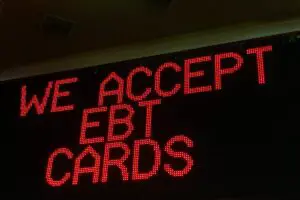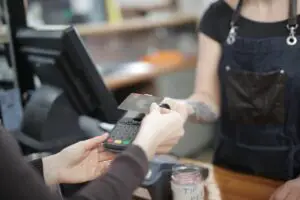*This post may contain affiliate links. As an Amazon Associate we earn from qualifying purchases.
EBT or Electronic Benefits Transfer gives participants in their program the ability to pay for food by using SNAP benefits. When a participant in this program shops at a store their EBT card is debited to reimburse the store for the food that the customer bought.
The card looks just like a regular debit card and allows them to buy their groceries and other items with their benefits at certain stores. So what if someone holding one of these cards wants to eat at Olive Garden? Are they a restaurant that accepts EBT?
Olive Garden does not accept EBT cards. Usually, only grocery stores or some convenience stores will take EBT and most restaurants (including Olive Garden) will not.
To receive an EBT card, you must first apply and meet the standards criteria. Usually, the criteria for an EBT card will have certain qualifications such as you are low-income, disabled, elderly, homeless, etc.
These cards are helpful if such a person needs money to buy groceries since the card is debited with their monthly allowance to spend at all participating locations so they can meet their needs.
There are only certain places you may use an EBT card at however and certain things you can spend the money on. The only restaurants that accept the card are fast food chains such as Burger KIng, Wendys, Taco Bell, Dominos, Golden Corral, KFC, etc. If you own a card you will need to know where to use it.
Olive Garden is a pricier restaurant that does not currently accept EBT.
What Restaurants Accept EBT?
If a person that has an EBT card decides to eat out they will only have certain places they may go that will accept the EBT card. The card will typically only be taken at a variety of fast food restaurants.
Many fast food restaurants will accept the EBT card depending on your rules and regulations in your area. The most common restaurants that accept EBT are:
- Burger King
- Wendys
- Taco Bell
- Pizza Hut
- Domino’s PIzza
- Golden Corral
- Denny’s
- Carl’s Jr.
- Wienerschnitzel
- Subway
- Cicis Pizza
- Quiznos
- Church’s Chicken
- KFC
- Jack in the Box
- Blimpie
- Papa Murphy’s
- and more
There are some specific locations of the above restaurants that don’t accept the card so you will need to be aware of where you can use it. One of the places that does accept EBT is Papa Murphy’s. They accept the card in all states.
To use your card at a fast food restaurant you have to qualify for the Restaurant Meal Program. After you have been qualified, you can buy food at fast food places. For more restaurants that accept EBT visit here.
Depending on what state you live in, you will have different benefits from using your EBT. States vary on where you can and can’t use the card since it is for the low-income, eldlery, diabled, or homeless.
Where Is EBT Accepted?
The Electronic Benefits Transfer card helps those who don’t make enough money to pay for food and groceries. Someone with disabilities or who is elderly can also get the card to help them.
Where can the EBT card be used at?
EBT cards can be used at all grocery stores and at many fast food restaurants.
Some places that take the EBT card are general merchandise stores like Target and Walmart. Dollar stores like Family Dollar also accept the card.
EBT is also accepted at membership stores such as Costco and Sam’s Club. 7-eleven and most other convenience stores will also take the card.
Value food stores like Aldi also take EBT cards for purchases.
Keep in mind that certain things cannot be bought with the card. Alcohol and cigarettes, or non-food items like pet food, household supplies, hot foods, etc. cannot be purchased with an EBT card.
Those with an EBT card are able to purchase groceries from all of these stores so they can take care of themselves. They get a certain amount devoted to their card to be used to buy the groceries.
There are other places where SNAP benefits can be used. To find the ones near you click here.
Can You Buy Garden Plants With EBT?
Not only does SNAP Benefits help people buy food but it also can help them grow their own food. So they can eat healthy meals from their own garden.
Can the seed and plants to do this be bought with the EBT card?
You can buy garden plants and seeds with EBT so you can grow your own food at home.
USDA.gov states, “For every $1 dollar spent on seeds and fertilizer, home gardeners can grow an average of $25 worth of produce. Growing food from seeds and plants makes SNAP benefits last longer, allowing recipients to double the value of their benefits over time. Supplementing SNAP with homegrown food makes it possible for families to buy food products that they wouldn’t normally be able to afford.”
It’s important to eat healthy and SNAP benefits want everyone to eat nutritious meals.
That’s why they made it possible for those with low-income to buy seeds to grow themselves if they want to. This not only gives them good vegetables to eat but also a sense of pride in a job well done.
If a participant grows their own foods from the seeds bought, the value of their benefits can double over time. This is great because it makes it possible for families or individuals that normally wouldn’t be able to buy certain food items to do so and to even grow the veggies and plants themselves.
It helps them to accomplish good work and reap the benefits from that.
Final Thoughts
Olive Garden does not take EBT but many fast food restaurants do. In order to use the EBT for these fast food restaurants you must qualify to become a part of the restaurant Meal program.
EBT cards are helpful for those who do not earn enough money to take care of their needs. You can
also use the card to buy groceries and garden plants.
So even though Olive Garden doesn’t take the EBT, they can be used in many other places.









